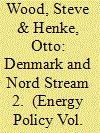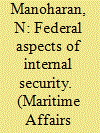| Srl | Item |
| 1 |
ID:
176122


|
|
|
|
|
| Summary/Abstract |
This article analyses Denmark's involvement with the Nord Stream 2 gas pipeline project. Impressing the Baltic as a sea of strategic significance and a potential international flashpoint, the controversial project thrust Denmark into a position of decision-making importance beyond its size and material power. Geopolitical and environmental considerations, and normative impetus derived from a liberal democratic political culture, influenced Danish attitudes towards the project. The impact of these concerns substantially delayed the granting of a permit for pipeline construction in the Danish marine space, frustrating governments and business in Russia and Germany. Ultimately, approval was granted because Denmark is a rule of law state. Yet the delay is crucial. More broadly, the article illustrates how, in the energy policy domain, illiberal regimes attempt to exploit liberal-democratic legal systems through nominally commercial entities, and considers the responses by other actors in this case.
|
|
|
|
|
|
|
|
|
|
|
|
|
|
|
|
| 2 |
ID:
133673


|
|
|
|
|
| Publication |
2014.
|
| Summary/Abstract |
The characteristics of Indian federalism are unique. The uniqueness is conspicuous by its dual character: "federal during normal times, but unitary in times of war". The study examines how such a federal set-up impinges on India's internal security management, including maritime and coastal security. Despite being in a stronger position constitutionally, the Centre has not been assertive. Finding out various reasons for the Union's hesitancy, the study advocates a stronger role for the Centre in internal security issues. The main reason being the threat matrix to India's internal security is such that it is beyond the capability of the States of India to counter them on their own, effectively. After analysing various constitutional and legal aspects of internal security, the study makes some key recommendations. It advocates the need for the Centre and the States to combine their efforts instead of blaming each other for internal security problems. "Cooperative Federalism" instead of "Competitive Federalism" is the suitable way ahead.
|
|
|
|
|
|
|
|
|
|
|
|
|
|
|
|